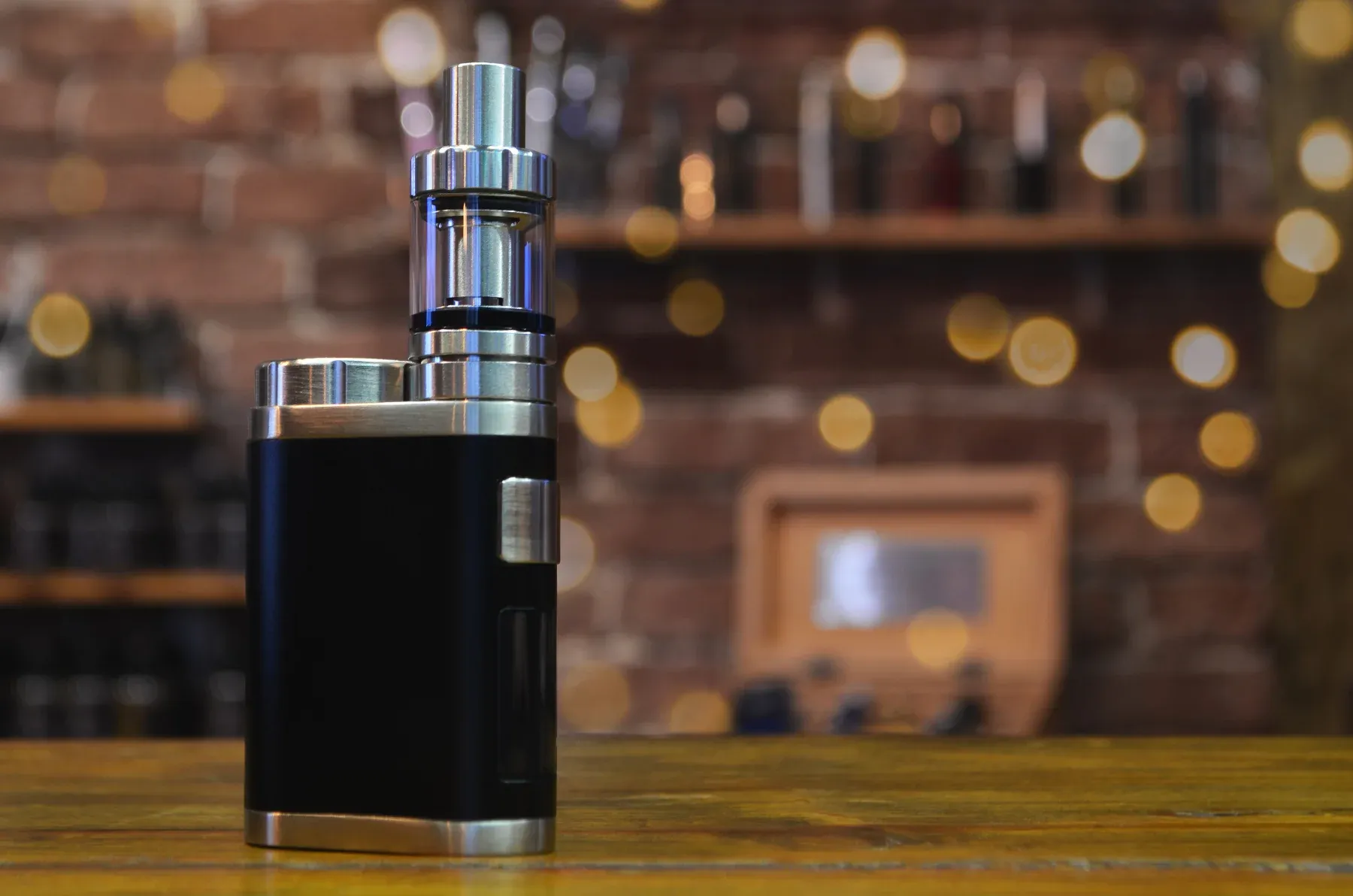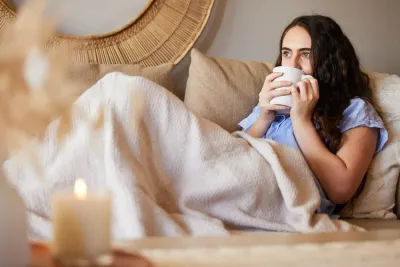
Key Takeaways
Nicotine negatively affects sleep by increasing alertness, delaying sleep onset, reducing deep sleep, and increasing nighttime awakenings. These effects can impact total sleep time and next day energy, even when nicotine is used earlier in the day.
- Nicotine is a stimulant that can make it harder to fall asleep and stay asleep, especially when used close to bedtime.
- Uses has been linked to reduced REM sleep, which plays a key role in memory, mood regulation, and emotional processing.
- People who smoke or use nicotine regularly may experience disrupted sleep due to overnight nicotine withdrawal.
- The way nicotine is delivered matters, with fast-acting forms like smoking or vaping having a stronger impact on sleep than slower-release options.
- Reducing or quitting nicotine often leads to better sleep quality over time, even if sleep temporarily worsens during the adjustment period.
Nicotine, a highly addictive substance found in tobacco products and e-cigarettes, has a profound impact on sleep. Many people who smoke (or use other forms of nicotine) report experiencing various sleep disturbances.
The sleep disturbances include difficulty falling asleep, frequent awakenings, and reduced overall sleep quality.
Understanding how nicotine affects sleep and its link to poor sleep quality can help individuals make informed decisions about their health and well-being.
Below, we’ll break down how nicotine causes issues with your sleep and why kicking the habit could be key to sleeping better and feeling your best.
How Nicotine Affects Sleep Quality
Research conducted in 2023, indicated that nicotine consumption is associated with a range of sleep disorders. [1] Smokers are almost 50% more likely to deal with sleep issues than non-smokers—a stat that highlights just how much nicotine can interfere with a good night’s rest. [2]
Note: Curious about sleep disorders? Conditions like sleep apnea can shed light on why good sleep feels out of reach—and how to get it back.
Nicotine disrupts your sleep cycle. It makes it harder to fall asleep, causes more middle-of-the-night wake-ups, and cuts into your deep sleep, the stage your brain and body rely on most for mental reset and recovery.
Nicotine and Stimulant Effects
Nicotine doesn’t just take the edge off; it fires up your system. It raises heart rate and blood pressure, making it harder to fall asleep.
If you use it too close to bedtime, it can trick you into thinking you’re not tired, dragging out the process of getting sleep. A 2025 study in Sleep found that having nicotine within four hours of bedtime cut overall sleep time, hitting people with insomnia the hardest. [3]
Nicotine vs. Caffeine; The Differences with Sleep
Caffeine usually takes the blame for late-night tossing and turning, but nicotine might be the bigger sleep saboteur. For most people, an afternoon coffee isn’t a dealbreaker. Nicotine, though? It’s far more likely to wreck your rest—especially if sleep already feels like a struggle.
Studies have shown that alcohol, caffeine, and nicotine, when consumed in the evening, can all interfere with the quality of sleep and continuity. Limiting nicotine and alcohol consumption in the hours before sleep is recommended to improve sleep quality. [4]
Did You Know: Keep in mind, that evening drink or vape can affect your sleep. Having alcohol, caffeine, or nicotine within four hours of bedtime has been linked to poorer sleep quality. Paying attention to what you consume at night can make a big difference.
Sleep Better While Quitting Nicotine
The Chilipad can help improve your sleep, and when you’re tackling something tough like quitting nicotine, quality rest can be your secret weapon. Stay cool, sleep deeper, and take control of your nights.
The Timing Factor: When You Consume Nicotine Matters
Timing matters when it comes to how it affects your sleep. Here's a quick breakdown of how using stimulants at different times of day can influence your overall sleep quality:
- Morning: Using it in the morning tends to have less effect on sleep, since your body is naturally more alert and active earlier in the day.
- Evening: It can make it harder to fall and stay asleep. These stimulants activate the nervous system and delay the body's natural wind-down process. For better sleep, it’s best to steer clear for several hours before bedtime.
- Right Before Bed: Consuming it right before bed is a recipe for restlessness, as it can significantly disrupt the natural sleep cycle and lead to fragmented sleep.
People who smoke in the evening tend to sleep fewer hours and experience more fragmented sleep. This means that smokers often get fewer hours of sleep compared to non-smokers, which can negatively impact their overall mental health.
Vapes, Cigarettes, Pouches and Patches—Do They Affect Sleep Differently?
Different nicotine delivery methods can impact sleep in their own ways. Here’s a quick look at how vapes, cigarettes, pouches, and patches vary in how fast they absorb and how they may affect your sleep:
Delivery Methods and Absorption Speeds
- Cigarettes: When smoked, nicotine enters the bloodstream rapidly, often within seconds. This quick absorption can lead to immediate stimulant effects, making it difficult to fall asleep if consumed close to bedtime.
- Vapes: Similar to cigarettes, vaping delivers nicotine quickly to the bloodstream. However, the exact absorption speed can vary based on the device and e-liquid formulation. Users may experience a rapid onset of effects, which can interfere with sleep if used in the evening or before bed.
- Pouches: Nicotine pouches absorb through the lining of the mouth, delivering nicotine at a moderate pace, slower than smoking or vaping, but faster than patches. They may still interfere with sleep if using a high nicotine content pouch or if used in the evening.
- Patches: Nicotine patches provide a slower, more controlled release of nicotine over several hours. This method results in steadier blood levels of nicotine, which may lead to fewer sleep disturbances compared to smoking or vaping, especially if the patch is removed before bedtime.
Myth: “Vaping Is Safer”
Sure, vaping sidesteps some of the toxic chemicals in cigarettes, but it still pumps nicotine into your system. That means restless nights, wired brains, and a hit to your overall mental health.
But we still don’t fully know the long-term health fallout of vaping. So calling it “safe” is a stretch.

Nicotine Levels Comparison
How much nicotine you take in—and how fast—shapes how it disrupts with your sleep, including the risk of sleep disorders such as sleep apnea.
- Cigarettes: Pack a hefty dose per puff, hitting hard and fast with stimulant effects.
- Vapes: Nicotine levels in e-liquids range from mild to sky-high. Some can rival cigarettes in how much they disrupt sleep.
- Pouches: Strength varies widely here, too. Higher doses can affect sleep much like smoking, and they may come with added oral health downsides.
- Patches: Deliver a lower, steady flow of nicotine. Less intense than smoking or vaping, but they can still stir up sleep issues if worn overnight.
Does Nicotine Keep You Awake at Night?
Yes, nicotine can keep some people awake at night. As a stimulant, nicotine ramps up your nervous system, making it harder to fall asleep and stay asleep.
People who smoke or use nicotine-based products often report trouble sleeping, frequent wake-ups, and feeling less rested in the morning.
Using nicotine in the evening can reduce your overall sleep efficiency, meaning you spend more time tossing and turning instead of getting quality sleep.
Even more concerning, research points to a pattern: the more you use nicotine at night, the worse your sleep tends to get over time.
When you're sleep-deprived, you may find yourself craving nicotine even more, creating a frustrating cycle that’s tough to break.
Does Nicotine Make You Tired?
At first, nicotine can give you a quick jolt of energy, but that boost doesn’t last. Over time, it can actually leave you feeling more drained. When nicotine levels drop, especially during withdrawal, fatigue often sets in as your body adjusts.
Common withdrawal symptoms like cravings, anxiety, and brain fog tend to peak around two to three days after quitting. The good news? That daytime tiredness usually starts to fade within the first few weeks, often improving noticeably by day 20.
Tip: If you're feeling tired, taking a short nap can help you recharge and feel more alert for the rest of the day.
Tips That Work to Decrease Your Nicotine Intake
Cutting back on nicotine isn’t easy, we get it. But sticking with it can lead to better sleep, more energy, and a clearer mind. Ready to make a change? Here are some strategies that can help:
- Nicotine Replacement Therapy (NRT): Products like gum and patches can help manage withdrawal symptoms. However, they may initially disrupt sleep, particularly the nicotine patch. The long-term benefits of quitting smoking or vaping outweigh these temporary sleep issues.
- Set a Quit Date: Setting a quit date gives you a clear goal to work toward—and it’s a great first step in gradually reducing your nicotine use. Letting friends or family know your plan can also help keep you accountable and supported along the way.
- Seek Support: Joining support groups or seeking professional help can provide encouragement and resources for quitting. There are multiple ways to access support services, including phone hotlines, webchat, and online resources.
- Identify Triggers: Recognizing situations or emotions that trigger the urge to use nicotine can help individuals develop coping strategies.
How to Sleep Better While Quitting Nicotine
Here are some tips to improve your sleep while you’re trying to quit:
Stick to a Consistent Sleep Schedule
Go to bed and wake up around the same time each day, even on weekends. When your schedule stays steady, your body knows when it’s time to wind down and when it’s time to wake up, making sleep feel easier and more refreshing.
Make Your Evenings Calm and Relaxing
Wind things down with small habits that help your brain switch gears. Read a few pages, take a warm bath, sip herbal tea, or queue up your favorite low-key sleep podcast.
Do the same few things each night, and your body starts to get the message. It’s time to relax, power down, and get good sleep.
How a Cool Bed and Bedroom Make You Comfortable
Sleeping in a cooler bedroom has its benefits and can change how your whole night feels. If you tend to wake up hot or sweaty, temperature control matters more than you think.
The Chilipad bed cooling system and mattress topper let you set your exact personalized sleep temperature, so your bed stays comfortable all night instead of getting hot once you finally fall asleep, like foam or gel mattresses.
By keeping your body from overheating and preventing night sweats, you can fall asleep faster and stay asleep longer. That can be especially helpful if you are quitting smoking and your body is already adjusting.
How Cutting Back on Stimulants Helps You Sleep
Caffeine has a longer memory than most people realize. That afternoon coffee or late-day energy drink can still be hanging around when your head hits the pillow.
Stopping caffeine and other stimulants earlier in the day gives your brain time to slow down, making it easier to fall asleep and stay asleep through the night.
Stay Active Throughout the Day
Getting some movement in during the day helps your body shake off stress and settle down at night. Even if you are at work or working from home, find small moments to get up and move.
A quick walk, light stretching, yoga, or an afternoon workout can help you fall asleep faster.
Consider Sleep Aids if You Need Extra Help
If falling asleep is still a struggle, natural options like melatonin or calming herbal teas may help take the edge off.
Just make sure to check in with a healthcare professional before adding any supplements, so you know they fit your body and your routine.
Tip: Want to boost your melatonin naturally? Here are some easy ways to support your body’s sleep hormone without taking supplements: boosting melatonin naturally.
Practice Mindfulness and Relaxation
When your mind will not shut off, simple relaxation techniques can help. A few minutes of deep breathing, meditation, or gentle yoga can calm your thoughts and cue your body that it is time to rest.
Studies show mindfulness meditation can improve sleep by lowering stress and quieting the mental noise that keeps you awake, making it easier to fall asleep and stay asleep. [1]
Bottom Line
Nicotine takes a real toll on both how long you sleep and how well you rest. While quitting can temporarily shake up your sleep, the right habits can help smooth out that adjustment.
Stick with it. Cutting back on nicotine pays off with better sleep, stronger recovery, and long-term health gains that are worth the short-term discomfort.
Frequently Asked Questions: Nicotine and Sleep
What Is The Link Between Nicotine And Sleep?
What Is The Link Between Nicotine And Sleep? Nicotine is a stimulant that disrupts sleep architecture—delaying REM and deep-sleep stages, increasing lighter sleep and nighttime awakenings, and shortening total sleep time—making smokers about 50?% more likely to report poor sleep quality.
How Soon Do Sleep Disturbances Occur After Nicotine Use?
Within seconds of inhalation, nicotine spikes heart rate, blood pressure, and alertness—often causing a 5–25?minute delay in falling asleep and triggering withdrawal-induced awakenings later in the night.
Does Vaping Affect Sleep Similarly To Smoking?
Vaping and smoking both deliver nicotine, so their effects on sleep are similar. The main difference is dose control, as vaping can lead to repeated nicotine exposure closer to bedtime, which may further disrupt sleep.
How Can I Sleep Better While Quitting Nicotine?
Here’s a quick sleep-hack checklist as your system detoxes:
- Avoid nicotine products (including NRT) at least 4-hours before bed
- Remove nicotine patches before bedtime
- Adopt consistent sleep–wake routines and a tech-free wind-down
- Exercise during the day
- Cut caffeine 8-hours before bed
- Try CBT?based strategies or melatonin if needed
- Quality sleep often begins improving 3–4 weeks after quitting
Does nicotine make it harder to fall asleep?
Yes. Nicotine is a stimulant that increases alertness and can delay the body’s natural wind down process, making it harder to fall asleep. It can also reduce total sleep time even if you do manage to fall asleep.
Peer-Reviewed Research References
-
Singh, N., Wanjari, A., Sinha, A.H.
Effects of Nicotine on the Central Nervous System and Sleep Quality in Relation to Other Stimulants.
Cureus, 2023.
Study Type: Narrative Review
Key Finding: Reviews evidence showing that nicotine acts as a central nervous system stimulant, disrupting sleep architecture, increasing sleep latency, and reducing overall sleep quality, particularly when used close to bedtime.
View Study
Source URL: https://pubmed.ncbi.nlm.nih.gov/38130519/
-
Jaehne, A., Loessl, B., Bárkai, Z., Riemann, D., Hornyak, M.
Effects of Nicotine on Sleep During Consumption, Withdrawal, and Replacement Therapy.
Sleep Medicine Reviews, 2009.
Study Type: Scientific Review
Key Finding: Demonstrates that nicotine use impairs sleep continuity and REM sleep, while withdrawal and nicotine replacement therapies can further alter sleep patterns during cessation periods.
View Study
Source URL: https://pubmed.ncbi.nlm.nih.gov/19345124/
-
Nuñez, A., et al.
Smoke at Night and Sleep Worse? Associations Between Cigarette Smoking, Insomnia Severity, and Sleep Duration.
Sleep Health, 2021.
Study Type: Observational Population Study
Key Finding: Found that cigarette smoking was associated with higher insomnia severity scores and shorter sleep duration, suggesting a dose-dependent relationship between nicotine exposure and poor sleep outcomes.
View Study
Source URL: https://pubmed.ncbi.nlm.nih.gov/33221256/









